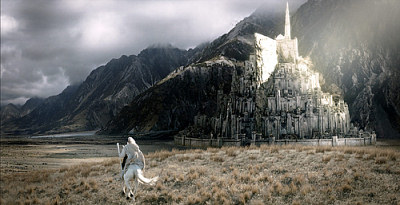




|
9 out of 10 |
 |
|
There was a lot of hype surrounding this movie,which is reason enough to be doubtful of the final film in the Lord of the Rings trilogy. It was tough rating The Return of the King because what you think of it can depend on what your expectations are going into the theatre. I tried to be fair given that I was disappointed in the parts that didn't appear as I'd imagined it (really the best way to enjoy these films is to not read the books first or else try to forget what you read) and the ending was quite drawn out and sappy. For one thing, this is not the version of the books and that much was obvious from the Fellowship of the Ring (the first film) onward. For another thing, the sap was indeed in the book and cannot be blamed entirely on director Peter Jackson.
The second film, The Two Towers picked up where Fellowship left off, but this time it's a bit different. We're treated to a reflection of sorts on events that happened long before Bilbo's eleventy-first birthday. This serves to give the audience a more detailed background into the character of Gollum (Andy Serkis) who is a major part of the story. Soon we are brought back to the trek to Mount Doom which Frodo (Elijah Wood) and Sam (Sean Astin) must undertake to save all Middle Earth from darkness. On the other side of the river, the nations of Gondor and Rohan must unite to face the innumerable forces of Mordor that are soon to attack, but there are, of course, complications.
To be honest, there are quite a few things I didn't like about this film. I didn't like Theoden (Bernard Hill)'s "But what has Gondor done for us lately?" attitude. I didn't think Eomer (Karl Urban) was very convincing. I didn't like how they changed the way a certain character died. I didn't like how one of the armies was at the Battle of the Pelennor Fields when they'd been released before then in the books and how the battle ended so quickly after they arrived. I didn't like how the identity of a disguised soldier was found out right away by a certain other character. I don't like writing criticisms that are so vague that if readers haven't seen the movie yet they still won't know exactly what I'm talking about. I didn't like the "We've still got Cate Blanchett so we'll put Galadriel in there again somehow and get our money's worth" part. I didn't like how one of the last chapters was more or less written out. It would have been an interruption in the long flow of sap that eventually led to the film's credits. And the biggest problem I have with it is the climax. A certain someone is being slowly enveloped by molten rock and yet shows no sign of being in any discomfort whatsoever until he's almost gone.
On the other hand, there were parts, even changed parts, that I really enjoyed. I liked the way Gollum tried to get rid of his 'competition', something that was done in the books. You know Sam isn't just going to take it like that and it reveals more about how both Gollum and Frodo are thinking at that point. I liked the scene where Pippin (Billy Boyd) looks into the palantir, even though it looked painful and I do like hobbits. It just looked so cool! I liked the conversation Gandalf (Ian McKellen) had with Pippin before entering the citadel, even if you saw where it was leading a mile away. I liked the singing. Mr. Boyd shows a tremendous vocal talent even if it's supplimented by studio effects. I liked how Gandalf took control of the city from the steward (John Noble). And I liked the lovely rendered-in-Ottawa Shelob. Other notable performances are of Merry (Dominic Monaghan) who, along with Pippin, changes roles from comic relief to something of greater substance; Gimli (John Rhys-Davies) and his indomitable attitude; Faramir (David Wenham) as the unappreciated son of Denethor; and Elrond (Hugo Weaving) as the conflicted parent.
On the whole it was an excellent movie. It was well presented, well acted, and the effects are wonderful and yet do not steal from the story itself as is so often the case with movies these days. Most of my complaints can either be attributed to simple disappointment and not failure on the part in doing those parts well. Most of the others can be attributed to the fact that those parts were actually done that way in the book and so would be more J.R.R. Tolkien's fault than Jackson's. The one problem that still stands is the climax, but it only merited the removal of one star since the rest of how that scene was done was superb, even in the ways in which it differed from the original texts. Also, if taken in the context of being only a third of a much larger story that had already proved excellent, it is definitely worth seeing on the big screen.
Film Critic:
Erica N. Cebrowski |
|